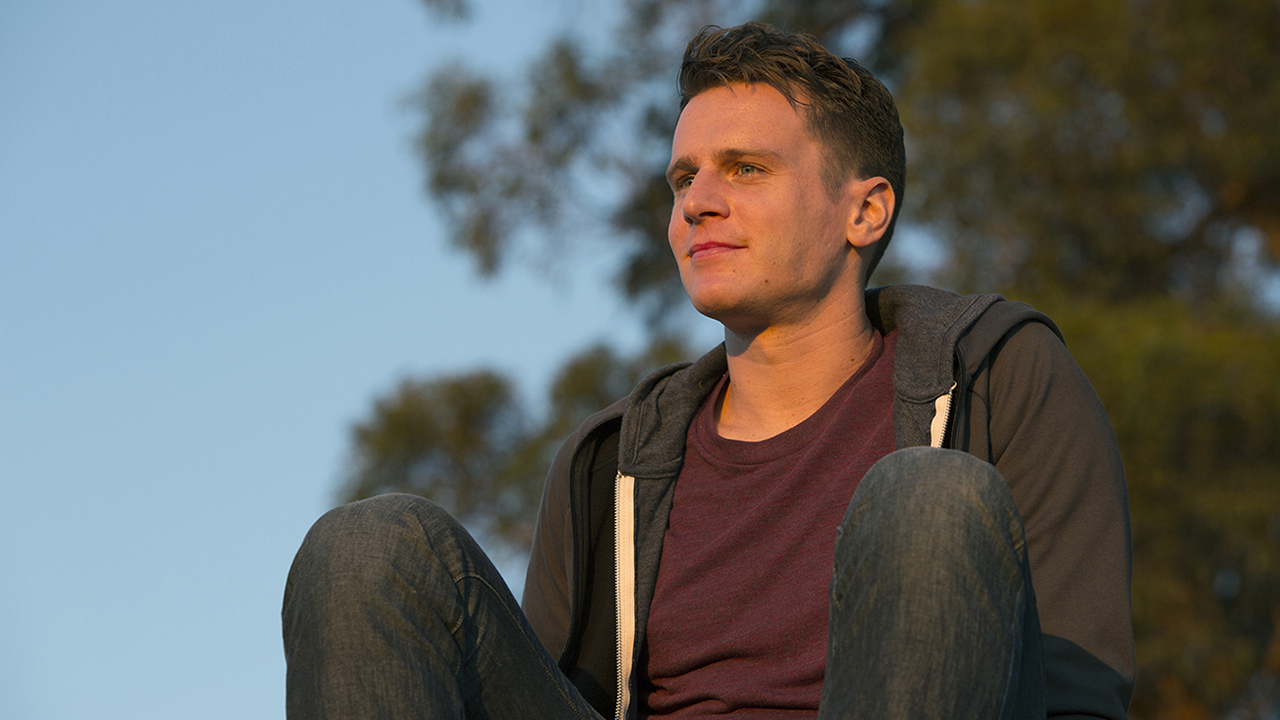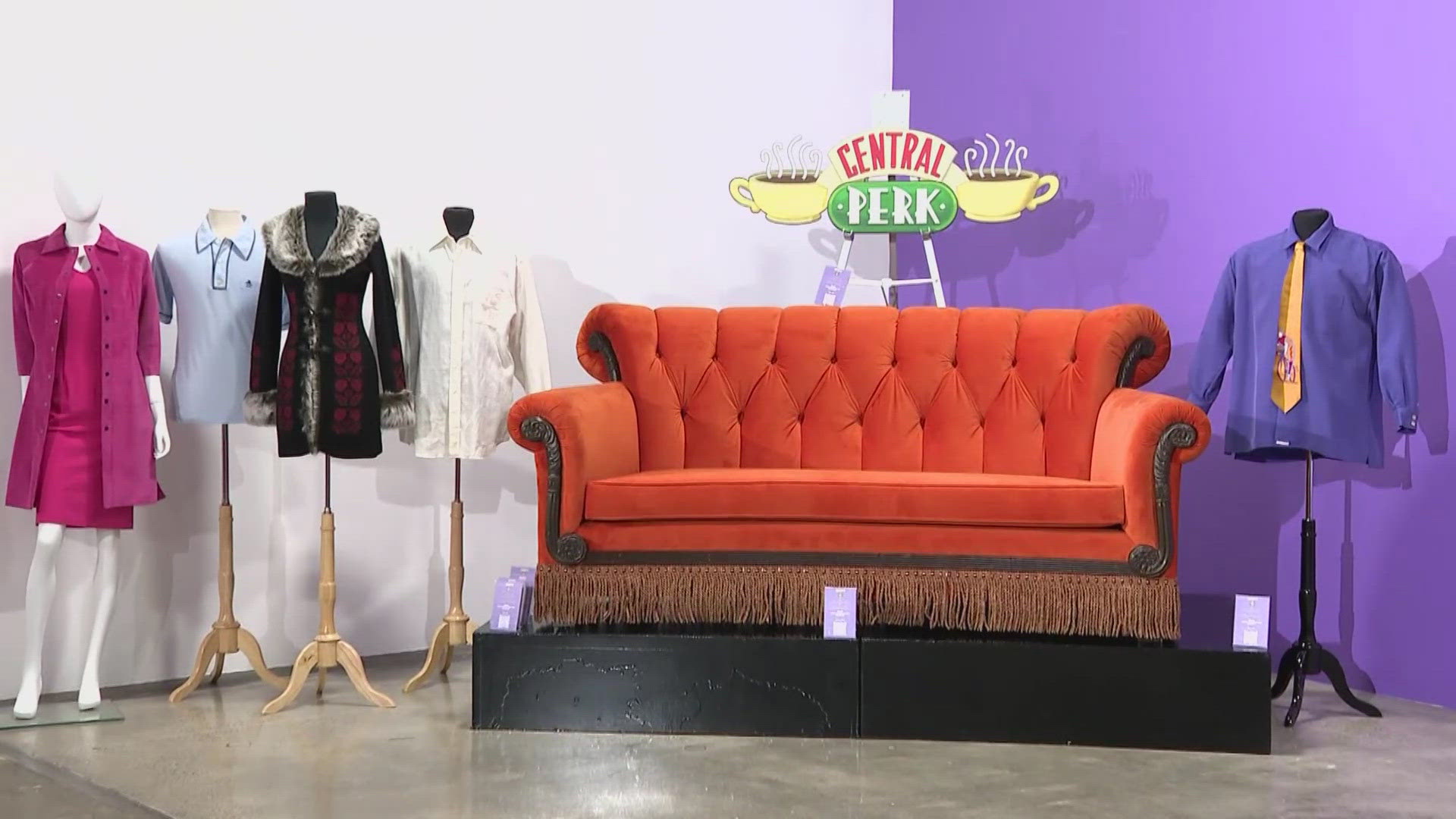After two short seasons and a not-all-that-surprising cancellation, Looking is tying up loose ends and giving fans a sense of closure with a 90-minute film, Looking: The Movie, premiering on HBO on Saturday, July 23. It's the final chapter in creator Michael Lannan's story about three gay men -- Patrick (Jonathan Groff), Agustin (Frankie J. Alvarez) and Dom (Murray Bartlett) -- living in San Francisco, looking for love, lust and meaning in their daily lives.
In the wake of the shooting at a gay nightclub in Orlando, Florida on June 12 that resulted in the death of 49 people, Looking: The Movie has taken on a new meaning, as it proudly showcases the club scene that has become a safe haven for LGBT expression.
"It's heartbreaking, but it makes you want to be louder, makes you want to be prouder, and makes you want to wave your flag more," Groff says, before adding: "It just makes everything feel so much more important."
For director Andrew Haigh, Groff says the club scene is where the director found himself. "He met his husband drunk, dancing in a club," the actor says. "The Stud, which we filmed in the first season, where Patrick is wearing a leather vest and reconnects with Richie [Raul Castillo] on the dance floor -- that is where Michael Lannan had his first kiss with a boy."
The series' biggest moments often took place in gay clubs and bars around the city, with many extended sequences in the film preserving that culture on screen.
"In the movie, we're celebrating this marriage and people are partying. People are getting together. People are meeting for the first time. I'm watching the last half of the movie and thinking, 'This is what was happening that night,'" Alvarez says of the San Francisco premiere, which closed out the Frameline Film Festival on the last night of the city's pride celebration. The premiere took place in the Castro District just 14 days after the shooting. "People on that day were very emotional and very aware of the importance of living and connecting with each other," Bartlett says.
While emotions are running high, the three stars stress that the movie, like the series, is and will always be about love. "There's a warmth to the film that I hope is inspiring and, maybe, in some way healing for all the sh*t that's been going on recently," Bartlett says.

From L to R: Jonathan Groff and Frankie J. Alvarez; Groff and Raul Castillo
HBO
At the center of the story is Patrick, a neurotic video game designer whose indecisiveness often tested the limits of his best friends and got him into trouble with boyfriends as he bounced back and forth between them. His primary lovers, Richie and Kevin (Russell Tovey), both offered love that Patrick couldn't quite reciprocate.
In the movie, which takes place a year after Patrick escapes to Denver to hit the reset button, he's back in town as Agustin is about to get married to Eddie (Mean Girls' Daniel Franzese). Meanwhile, Dom, who still dons his shearling jacket, has found purpose as owner of a new peri peri chicken restaurant as his best female friend, Doris (Lauren Weedman, who, sadly, does not get enough credit for her contribution to the series), settles into monogamous life with boyfriend Malik (Bashir Salahuddin).
(Of note: Bartlett reveals Dom's iconic accessory is in the wardrobe of his Brooklyn apartment. "Sometimes I just put it on and sit around my living room," he says, igniting fantasies everywhere.)
Patrick's return to San Francisco reignites unresolved feelings for Richie and a newly blond Kevin, thanks to Tovey's role in Arthur Miller's A View From the Bridge on Broadway at the time. (Slight spoiler: the actor shot all of his scenes in a day before hopping on a plane back to New York City.) And the film sees Patrick negotiating with his feelings on love in order to find happiness.
"When I grew up, going to movies and watching TV, I would always live vicariously through the female character," Groff says. "You're always relating to the girl falling in love with the guy, but in a show like Looking, there are two men at the center of the story. That, I think, is pretty powerful and not seen a lot and -- I hate the word important, but that has an impact and hopefully that will continue to have an impact, knowing that is captured forever on film."
The film admittedly will not please all fans, but even when the series was on the air, it never did. A realistic look at modern gay culture, the show was often criticized for being banal. One of the few major LGBT-centric series on U.S. television, it was not as loud or sexy as Queer as Folk. It was also not the "gay Girls," a description that stuck with it after it premiered behind Lena Dunham's series.
"It's about falling in love, it's about friendships, and it's about male intimacy," Groff tells ET, addressing the realistic tone that often incited ire from critics. At its best, Looking was heartfelt, funny and frustratingly relatable. "It's just life," he adds.
In fact, the show often paralleled the stars' own real-life experiences. "I don't want to go too much into it, but Jonathan needed to do some shopping at a sex store. He needed some props," Alvarez says of a time he and his co-star went shopping in New York City's West Village, a moment that was similar to their characters' journey to Rite Aid to get Patrick an enema. "We were like, 'Oh my god. We just experienced this as Frankie and Jonathan.' There were many moments like that."

From L to R: Jonathan Groff, director Andrew Haigh and Russell Tovey
HBO
Haigh, the director of the Oscar-nominated 45 Years who also executive produced the series and directed a few episodes, mirrored Looking's tone and pacing after his modern gay classic, Weekend. Yes, there was sex (with the movie seeing Groff in one of the most explicit gay sex scenes in recent history), but there were also a lot of quieter scenes shared between characters.
"What I love about working with Andrew in particular is that the scene could be about anything, but the direction of the scene went toward what was happening between these people, what was happening between the words," Bartlett says. "How are they relating to each other?"
In the end, the film will satisfy most those who enjoyed Patrick's emotional journey over the course of the series. Groff, who is in every scene here, delivers an unwavering, award-worthy performance despite Patrick's penchant for tears and embarrassment as he carries the story to its final conclusion. The final scenes see Groff experience a gamut of emotions.
MORE: Why Jonathan Groff's 16-Year-Old Self Is 'Still Freaking Out' Over His Second Tony Nomination
"Everything is stripped away," Groff says, crediting Haigh for capturing the actor's ability to cry (or blush) on command. "It's very intimate filmmaking, which is Andrew's thing. The camera is right there, it's about you and the other actor and you're just very exposed. This whole experience has been that for me, which has been great. It allows you to feel all those things."
"It's funny, because at the audition for this show three years ago, there was a scene with Richie in the train where he hits on me. I prepared the lines at home and then I came into the audition and during the scene, I broke out into a sweat," Groff says. "I think now, in retrospect, with this show, you're doing these very intimate scenes -- even if it's just a scene on a train with someone hitting on you -- and it makes my palms sweat."


